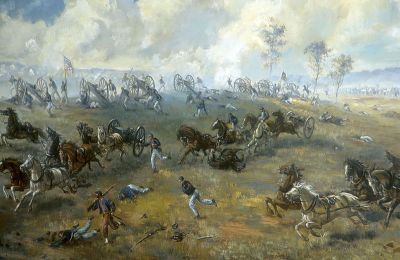On farms and plantations North and South, early morning chores are underway when Union artillery fire at 5:15 a.m. breaks the silence of dawn at Manassas Junction, Virginia on this Sabbath day. The Battle of Manassas (so-named in the South) or Bull Run (in the North) has begun.
U.S. Brig. Gen. Irvin McDowell’s Union forces push against Brig. Gen. P.G.T. Beauregard’s Confederates, initially taking the offense. Both armies unseasoned, tens of thousands of soldiers North and South square off in fields and woods. As hundreds of thousands of Americans and Confederates on the home front ready for church, artillery booms, canons whiz, trees splinter and blood spills upon the land near Manssas Junction. Human cries of desperation, confusion and searing agony contend with the sharp retorts of thousands of indifferent rifles, intermittently shrouded with the weapon-induced smoke that hovers over the chaos.
The day is hot, the bullets hotter. Blood is everywhere as Americans slaughter one another. Yet away from the resounding fury of death and destruction, thousands of preachers in thousands of churches preach from the Bible to congregations unaware. In many churches, the communion bread is passed around and congregates solemnly remember Christ’s spilling of his blood for mankind.
Hundreds of thousands of souls lift their voices and sing hymns to God. Among Baptist hymns is one by southern divine Richard Furman. “Sovereign of All the Worlds Above” is a popular hymn included in the 1850 Baptist Psalmody. The words are now painful:
These western States, at thy command,
Rose from dependence and distress;
Prosperity now crowns the land,
And millions join thy name to bless.Praise is thy due, eternal King!
We ‘ll speak the wonders of thy love,
With grateful hearts our tribute bring,
And emulate the hosts above.O! be thou still our guardian God;
Preserve these States from every foe ;
From party rage, from scenes of blood,
From sin, and every pause of woe.Here may the great Bedeemer reign,
Display his grace and saving power!
Here liberty and truth maintain,
Till empires fall to rise no more.
A now-broken empire hurdles sons against sons. Flesh is ripped open. Life pours upon earthen battlefields as familiar heavenly melodies waft from church houses Baptist, Methodist, Presbyterian and Congregationalist:
“Amazing grace, how sweet the sound”
11:30 AM. U.S. Colonel William T. Sherman fords the Bull Run River and catches the right flank of Confederate defenders by surprise. The Confederate line collapses in an uneven retreat to Henry House Hill.
“That saved a wretch like me”
12:00 Noon. The Confederates make a stand on Henry House Hill, led by Brig. Gen. Thomas J. Jackson’s Virginia brigade. The two sides lob artillery at close range.
“I once was lost, but now I’m found”
Confederate officers voice fear that Union forces will overwhelm them. Jackson is said to have replied, “Then, Sir, we will give them the bayonet.” Brig. Gen. Bernard Bee observes Jackson’s coolness in the midst of heavy fire. He shouts to his men, “There is Jackson standing like a stone wall. Let us determine to die here, and we will conquer. Rally behind the Virginians.” The legend of “Stonewall” Jackson is born.
“Was blind but now I see”
3:00 PM. The 33rd Virginia captures a union artillery battery. Jackson orders more regiments forward. More Union guns are captured. Union forces fall back. The tide has turned.
The battle is over by late afternoon. As stragglers on church grounds North and South leisurely turn their horses and buggies homeward after an afternoon of eating and socializing, retreating Union forces descend into disorder as they flee from the battlefield, clogging the roads to Washington and causing a panic among nearby civilians. Confederate forces capture hundreds of the enemy, but in their joy and exhaustion do not pursue the retreating Union army.
Night falls. Guns and rifles, having spoken, are now silent. This day of worship and war is over but will not be forgotten. A hero has been born in the hour of the South’s need. Southerner’s sing the praises of God, while northerners wail before God in confusion and agony.
In victory, the Confederacy is emboldened in its rebellion against the United States. Yet more stark than defeat and victory is the human cost of the battle: a total of some 5,000 casualties, including 460 Union and 387 Confederate soldiers dead this Sabbath day. Even as the North laments defeat and the South celebrates success, the enormous, at this time, spilling of blood casts a somber pall over officers and soldiery on both sides. The general sloppiness of military execution during the battle makes both sides realize the need for more military training before further engagements.
A space of relative battlefield silence settles upon an unsettled land.
It shall not last.
Sources: Summary of the First Battle of Manassas / Bull Run and painting (link); Richard Furman’s hymn in Henry S. Burrage, Baptist Hymn Writers and Their Hymns (Portland, Maine: Henry S. Burrage, 1888), pp. 234-235 (link)



